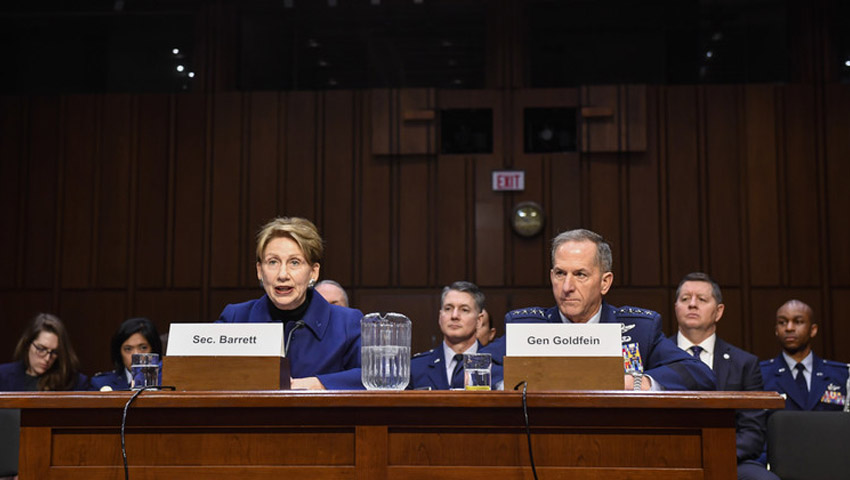US Air Force Secretary Barbara Barrett and Chief of Staff General David Goldfein told the Senate Armed Services Committee that an “aggressive package of strategic trades” is necessary to successfully reshape the service to confront emerging threats from “peer competitors” such as China and Russia.
To continue reading the rest of this article, please log in.
Create free account to get unlimited news articles and more!
The Senate Armed Services Committee hearing featured Gen Goldfein and Secretary Barrett and focused on the department’s recently released US$169 billion ($256 billion) budget proposal for fiscal year 2021.
Gen Goldfein explained to the committee, "This budget, building on the last three, offers the most aggressive package of strategic trades we have made as a service in over two decades to achieve complete alignment with the National Defense Strategy and secures our nation’s military superiority over the next decade."
But the budget, while modernising the force and the two legs of the nuclear triad among other upgrades, also calls for retiring a collection of older planes to free up funding for critical new equipment.
The list includes 13 KC-135 Stratotankers and 16 KC-10 Extenders; 24 C-130H Hercules, 17 B-1 Lancers and 24 RQ-4 Global Hawk Block 20/30 aircraft, among others.
That decision, both Gen Goldfein and Secretary Barrett said, reflected the hard but necessary choices. In broad terms, Secretary Barrett told the committee that the Air Force’s plans and practices are rooted in four overarching concepts.
The first is "connect the joint force", which is short-hand for an ambitious effort to collect, analyse and transmit vast amounts of data from air, land, sea, space and cyber to all services and commanders in a way that overwhelms adversaries.
The effort, known as Joint All Domain Command and Control, or JADC2, is designed to "more seamlessly integrate as a joint team" in a battle network that links all sensors to all shooters.
The second priority is to "dominate space", which essentially means ensure the successful launch and sustainment of the newly created Space Force.
"The Department of the Air Force supports a lean and agile Space Force that ensures superiority in space, provides deterrence and, if deterrence fails, combat power," Secretary Barrett said.
The third element is ensuring the ability to "generate combat power" with an emphasis on modernising the ageing land and airborne legs of the nuclear arsenal; continuing to increase the number of squadrons to 386; continuing to improve readiness and working to bring new weapons systems such as the B-21 long range strike bomber into reality on schedule and on budget.
Gen Goldfein added, "This budget moves us forward to recapitalise our two legs of the triad and the critical nuclear command and control that ties it all together."
Finally, the Air Force budget and policy decision are aimed at ensuring a more nimble, "expeditionary" force that is able to "conduct logistics under attack to sustain high-tempo operations as long as needed".
While the hearing was largely cordial and straightforward, senators indicated unease with some of the choices in the budget, especially those to retire aircraft.
Questions from lawmakers also ranged from classification standards, threats from Russia and China, the plan and schedule for resolving problems connected with the new KC-46 tanker, and more parochial questions about local bases and the schedule for replacing propeller blades on MC-130H.
The hearing on Tuesday was the first step in a lengthy process that will yield legislation providing a blueprint written by Congress of the spending, security and policy priorities for the entire US military.
Stephen Kuper
Steve has an extensive career across government, defence industry and advocacy, having previously worked for cabinet ministers at both Federal and State levels.

 Login
Login








